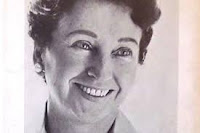Just how nervous are you these days? After all, October is the month of ghosts and goblins, of evil witches in black pointy hats and killer warlocks lurking in dark shadows. Throw some salt over your shoulder!
Those of us in the thriller field deal in terror all year round. We call it suspense. In our corner of the literary universe, we use spies and scientists, politicians and kidnap negotiators, to tell our stories of combating terror. What frightens you most these days? How about dictators waving clenched fists (and nukes) at the world? That makes my blood run with ice.
During the Cold War, political thrillers were one of the most popular and useful means for readers to gain insight and grapple with what we called in those days the Balance of Terror. Freedom vs Communism. The West vs the Evil Empire.
 |
| Helen MacInness |
Remember the great tales of Helen MacInnes, John le Carré, Frederick Forsyth, Ken Follett, and others?
Readers learned while being entertained as the authors of that era probed, revealed, and for a few moments gave us a sense of order. Our species relies on adaptability and ingenuity for survival. If reality is too complex and difficult to parse, then give us a good yarn that deals with the same forces. Then we can live through heroes and heroines as they take on master evildoers so powerful that they seem invincible.
How did those Cold War authors do it?
 |
| John le Carré |
The same way we do it today: In increments. In other words, smaller but significant problems — an assassination plot, a secret weapon, a rigged election, an anthrax cache, a cybercriminal on the verge of bankrupting a nation. One of homo sapiens most primitive drives is to create order to ward off the long black night of nothingness. Many of us still turn to fiction. And along the way, good books probe problems and suggest solutions.
In an earlier blog, I listed events my novels seemed to have predicted, and I’m not the only one who’s done this. Many other contemporary writers — including my fellow Rogues — have had the same predictive experience. Why is that?
The mysterious but not-so-secret ingredient is chaos, not only out in the world but within ourselves. Chaos terrifies us. But at the same time, it can be useful. As Nietzsche wrote in Thus Spake Zarathustra: “[O]ne must still have chaos in oneself to be able to give birth to a dancing star.” Chaos forces us to think, to pursue order, to use our imaginations to find new solutions, to be entrepreneurial, to improvise and innovate. To write with a seeming crystal ball.
So in this month of ghosts and goblins, witches and warlocks, look for dancing stars in the shadows … and read some good books.
Do you have a wonderful Halloween tale to suggest? We’d love to hear it.

















































Thanks for reminding us that the scariest things in life aren't the supernatural. Great post.
Gayle, you have written a very thought-provoking article here — about why many of us read (and write) thrillers. With all the chaos in the world, as you recount, these novels give us ideas – even inspiration — through the actions of heroes and heroines — of how to handle it and thwart the bad guys trying to foment such scenarios. And your novels certainly have been prescient in so many ways. Thanks for great post!
This comment has been removed by the author.
Your novels have, too, Karna. I love the way they probe and take on interesting and dangerous situations! Long live spy thrillers!
Thanks, S Lee!!!!
The tough thing about political thrillers today, of course, is that actual events already feel like fiction….
That may be the subject of another blog post: How to interest readers in political thrillers when the news each day seems increasingly incredible.
That seems to me to be an important question, Francine. Where is the line, or has it been completely erased? I hope not.